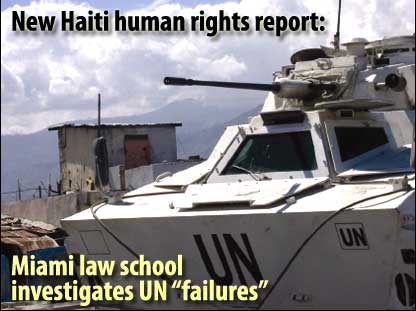|
New Haiti human rights report: Miami Law school investigates UN "failures"
July 22, 2006
|
News
HaitiAction.net
|
||||
 |
 |
 |
 |
 |
 |
 New Haiti human rights report: Miami Law school investigates UN "failures"
New Haiti human rights report: Miami Law school investigates UN "failures"
A new human rights report on Haiti was released today by the Center for the Study of Human Rights at the University of Miami, School of Law. The study is titled "Haiti: Human Rights Investigation - March 11-16 2006" and is available from the UM website.
Three students - Anna Mance, Quinn Smith and Rebecca Yagerman - traveled to Haiti in March of this year to investigate the role of the UN occupation forces (MINUSTAH) in the atrocities and other human rights abuses during the years of the US-installed coup government.
Excerpts from "Haiti: Human Rights Investigation - March 11-16 2006"
"As human rights atrocities continue to occur across Haiti, the United Nations Stabilization Mission in Haiti (MINUSTAH) has received much criticism for failing to adhere to its mandate to "promote and protect human rights."1 Indeed this failure has been one of the major causes of the prolonged suffering of the Haitian people during the interim government's reign between 2004 and 2006 ... MINUSTAH has failed both to actively and aggressively investigate atrocities and to account for its own human rights violations."
| Click image below to download the 1.2M PDF file |
 |
| by ANNA MANCE, QUINN SMITH and REBECCA YAGERMAN
INTRODUCTION: IRWIN P. STOTZKY |
"Judges are under significant pressure not to release prisoners, regardless of the evidence against them. In July 2004, ANAMAH, the national judge's association, issued a press release condemning executive interference in judicial matters. In December, the Minister of Justice personally wrote to the Chief Judge of the Port-au-Prince Trial Court, ordering him to take all the cases away from Judge Fleury, who had ordered Father Jean-Juste's release. The Minister of Justice also ordered the Chief Judge to take all the cases away from Judge Fabien, who had ordered the release of four other people who had spent ten months in jail on trumped up charges. These orders are as illegal in Haiti as they are in the United States. One of the judges resigned in protest."
"The press is not able to monitor effectively the police. As the Committee to Protect Journalists and others have documented, attacks against journalists by private groups and the government have sent many journalists into hiding, and silenced others. In mid January 2005, the police executed Abdias Jean, a journalist with a Florida radio station, after he witnessed police executing two men. Several press organizations and UNESCO denounced this killing. In another notorious incident in January 2005, Prime Minister Gerard Latortue threatened journalist Guy Delva, the correspondent for Reuters in Haiti and the head of the Haitian Journalists Association. Journalists who criticize the insurgents, the gangs, the police, and the government have been threatened, beaten, even kidnapped."
"For example, on August 20, 2005, members of the Haitian National Police, acting in concert with gang members wielding machetes and guns, caused mayhem during a USAID-sponsored soccer match in the Grande-Ravine at Martissant slum neighborhood. General Carlo Lochat of the Haitian National Police, was identified by Haitian investigators as one of the leaders of the massacre, and sent before a tribunal. However, in early March 2006, he was provisionally released, and it is unclear whether he will be further charged. Fagart states that he is aware of the incident, yet no report has been issued. The failure to issue timely reports on the Martissant massacre is a clear violation of the mandate which stipulates that Fagart and his human rights officials are 'to monitor and report on the human rights situation.'"
"These cases of flagrant human rights violations as well as those of prominent political prisoners, such as Fr. Gerard Jean-Juste and former Prime Minister Yvon Neptune, have been cast into the world spotlight, receiving international attention in the press. Again, Fagart as well as the UN High Commissioner of Human Rights are aware of these cases. However, as an independent, sovereign country with an officially independent judiciary, Fagart contends that Haitian laws are to be followed. He suggests that the fear of infringing on national sovereignty, as well as a perpetual series of obstacles blocking his path, prevent him from securing the release of prominent political prisoners. Fagart's inability 'to ensure individual accountability for human rights abuses and redress for victims,' as the mandate demands, by securing their release from prison where they are being illegally detained, is a breach of the mandate."